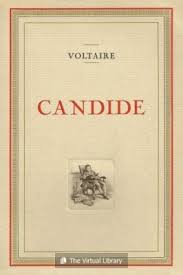Candide Page #4
Candide, ou l'Optimisme, is a French satire first published in 1759 by Voltaire, a philosopher of the Age of Enlightenment.
"What can be the sufficient reason of this phenomenon?" said Pangloss. "This is the Last Day!" cried Candide. The sailor ran among the ruins, facing death to find money; finding it, he took it, got drunk, and having slept himself sober, purchased the favours of the first good-natured wench whom he met on the ruins of the destroyed houses, and in the midst of the dying and the dead. Pangloss pulled him by the sleeve. "My friend," said he, "this is not right. You sin against the universal reason; you choose your time badly." "S'blood and fury!" answered the other; "I am a sailor and born at Batavia. Four times have I trampled upon the crucifix in four voyages to Japan[5]; a fig for thy universal reason." Some falling stones had wounded Candide. He lay stretched in the street covered with rubbish. "Alas!" said he to Pangloss, "get me a little wine and oil; I am dying." "This concussion of the earth is no new thing," answered Pangloss. "The city of Lima, in America, experienced the same convulsions last year; the same cause, the same effects; there is certainly a train of sulphur under ground from Lima to Lisbon." "Nothing more probable," said Candide; "but for the love of God a little oil and wine." "How, probable?" replied the philosopher. "I maintain that the point is capable of being demonstrated." Candide fainted away, and Pangloss fetched him some water from a neighbouring fountain. The following day they rummaged among the ruins and found provisions, with which they repaired their exhausted strength. After this they joined with others in relieving those inhabitants who had escaped death. Some, whom they had succoured, gave them as good a dinner as they could in such disastrous circumstances; true, the repast was mournful, and the company moistened their bread with tears; but Pangloss consoled them, assuring them that things could not be otherwise. "For," said he, "all that is is for the best. If there is a volcano at Lisbon it cannot be elsewhere. It is impossible that things should be other than they are; for everything is right." A little man dressed in black, Familiar of the Inquisition, who sat by him, politely took up his word and said: "Apparently, then, sir, you do not believe in original sin; for if all is for the best there has then been neither Fall nor punishment." "I humbly ask your Excellency's pardon," answered Pangloss, still more politely; "for the Fall and curse of man necessarily entered into the system of the best of worlds." "Sir," said the Familiar, "you do not then believe in liberty?" "Your Excellency will excuse me," said Pangloss; "liberty is consistent with absolute necessity, for it was necessary we should be free; for, in short, the determinate will----" Pangloss was in the middle of his sentence, when the Familiar beckoned to his footman, who gave him a glass of wine from Porto or Opporto. VI HOW THE PORTUGUESE MADE A BEAUTIFUL AUTO-DA-FÉ, TO PREVENT ANY FURTHER EARTHQUAKES; AND HOW CANDIDE WAS PUBLICLY WHIPPED. After the earthquake had destroyed three-fourths of Lisbon, the sages of that country could think of no means more effectual to prevent utter ruin than to give the people a beautiful auto-da-fé[6]; for it had been decided by the University of Coimbra, that the burning of a few people alive by a slow fire, and with great ceremony, is an infallible secret to hinder the earth from quaking. In consequence hereof, they had seized on a Biscayner, convicted of having married his godmother, and on two Portuguese, for rejecting the bacon which larded a chicken they were eating[7]; after dinner, they came and secured Dr. Pangloss, and his disciple Candide, the one for speaking his mind, the other for having listened with an air of approbation. They were conducted to separate apartments, extremely cold, as they were never incommoded by the sun. Eight days after they were dressed in san-benitos[8] and their heads ornamented with paper mitres. The mitre and san-benito belonging to Candide were painted with reversed flames and with devils that had neither tails nor claws; but Pangloss's devils had claws and tails and the flames were upright. They marched in procession thus habited and heard a very pathetic sermon, followed by fine church music. Candide was whipped in cadence while they were singing; the Biscayner, and the two men who had refused to eat bacon, were burnt; and Pangloss was hanged, though that was not the custom. The same day the earth sustained a most violent concussion. Candide, terrified, amazed, desperate, all bloody, all palpitating, said to himself: "If this is the best of possible worlds, what then are the others? Well, if I had been only whipped I could put up with it, for I experienced that among the Bulgarians; but oh, my dear Pangloss! thou greatest of philosophers, that I should have seen you hanged, without knowing for what! Oh, my dear Anabaptist, thou best of men, that thou should'st have been drowned in the very harbour! Oh, Miss Cunegonde, thou pearl of girls! that thou should'st have had thy belly ripped open!" Thus he was musing, scarce able to stand, preached at, whipped, absolved, and blessed, when an old woman accosted him saying: "My son, take courage and follow me." VII HOW THE OLD WOMAN TOOK CARE OF CANDIDE, AND HOW HE FOUND THE OBJECT HE LOVED. Candide did not take courage, but followed the old woman to a decayed house, where she gave him a pot of pomatum to anoint his sores, showed him a very neat little bed, with a suit of clothes hanging up, and left him something to eat and drink. "Eat, drink, sleep," said she, "and may our lady of Atocha,[9] the great St. Anthony of Padua, and the great St. James of Compostella, receive you under their protection. I shall be back to-morrow." Candide, amazed at all he had suffered and still more with the charity of the old woman, wished to kiss her hand. "It is not my hand you must kiss," said the old woman; "I shall be back to-morrow. Anoint yourself with the pomatum, eat and sleep." Candide, notwithstanding so many disasters, ate and slept. The next morning the old woman brought him his breakfast, looked at his back, and rubbed it herself with another ointment: in like manner she brought him his dinner; and at night she returned with his supper. The day following she went through the very same ceremonies. "Who are you?" said Candide; "who has inspired you with so much goodness? What return can I make you?" The good woman made no answer; she returned in the evening, but brought no supper. "Come with me," she said, "and say nothing." She took him by the arm, and walked with him about a quarter of a mile into the country; they arrived at a lonely house, surrounded with gardens and canals. The old woman knocked at a little door, it opened, she led Candide up a private staircase into a small apartment richly furnished. She left him on a brocaded sofa, shut the door and went away. Candide thought himself in a dream; indeed, that he had been dreaming unluckily all his life, and that the present moment was the only agreeable part of it all.
Translation
Translate and read this book in other languages:
Select another language:
- - Select -
- 简体中文 (Chinese - Simplified)
- 繁體中文 (Chinese - Traditional)
- Español (Spanish)
- Esperanto (Esperanto)
- 日本語 (Japanese)
- Português (Portuguese)
- Deutsch (German)
- العربية (Arabic)
- Français (French)
- Русский (Russian)
- ಕನ್ನಡ (Kannada)
- 한국어 (Korean)
- עברית (Hebrew)
- Gaeilge (Irish)
- Українська (Ukrainian)
- اردو (Urdu)
- Magyar (Hungarian)
- मानक हिन्दी (Hindi)
- Indonesia (Indonesian)
- Italiano (Italian)
- தமிழ் (Tamil)
- Türkçe (Turkish)
- తెలుగు (Telugu)
- ภาษาไทย (Thai)
- Tiếng Việt (Vietnamese)
- Čeština (Czech)
- Polski (Polish)
- Bahasa Indonesia (Indonesian)
- Românește (Romanian)
- Nederlands (Dutch)
- Ελληνικά (Greek)
- Latinum (Latin)
- Svenska (Swedish)
- Dansk (Danish)
- Suomi (Finnish)
- فارسی (Persian)
- ייִדיש (Yiddish)
- հայերեն (Armenian)
- Norsk (Norwegian)
- English (English)
Citation
Use the citation below to add this book to your bibliography:
Style:MLAChicagoAPA
"Candide Books." Literature.com. STANDS4 LLC, 2025. Web. 21 Jan. 2025. <https://www.literature.com/book/candide_25>.




Discuss this Candide book with the community:
Report Comment
We're doing our best to make sure our content is useful, accurate and safe.
If by any chance you spot an inappropriate comment while navigating through our website please use this form to let us know, and we'll take care of it shortly.
Attachment
You need to be logged in to favorite.
Log In